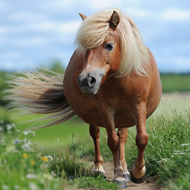QR code trial to help tackle equine obesity

"Approaching the conversation about a horse's weight can be difficult" - Lucy Grieve, BEVA.
The British Equine Veterinary Association (BEVA) has launched a second phase pilot project to help increase engagement with vets and owners on the topic of equine obesity.
It follows the launch of BEVA's traffic light scheme in January 2020, whereby vets place a coloured sticker on the front of passports at each vaccination appointment relating to the horse or pony's current weight.
The new, simplified scheme involves vets issuing a black or white QR code sticker during a vaccination visit. The QR code directs owners to a series of videos providing practical advice on how to manage or reduce their animal's weight.
BEVA president Lucy Grieve explained: “Using a less direct method of communication such as this seems to make it more comfortable for owners to recognise and accept that their horse is overweight. This should be the kickstart they need to embark on a supported path of rehabilitating their horse to a healthy body condition.”
Equine obesity is considered to be one of the biggest threats to horse welfare in the UK. BEVA says that, despite the best efforts of vets to address the issue, many owners are either not recognising obesity in their horses, or are simply not being motivated to take action.
As Lucy explains: “Approaching the conversation about a horse’s weight with an owner can be difficult; sometimes what we say is not what the other person hears but by making small changes in how we word things can have a big impact.”
BEVA has been addressing equine obesity for some time now, recognising that veterinary professionals are in the best position to provide advice and support to owners.
As such, the organisation has joined forces with social scientist Tamzin Furtado from the University of Liverpool, who has a specific interest in how human behaviour change can improve the management of obesity in horses. Tamzin features in an online video to support vets entitled: The elephant in the room: How to address the topic of obesity in horses.
The video is just one of several resources available for veterinary professionals on BEVA’s equine obesity page. Additional resources include relevant research and CPD courses, a body condition scoring chart, a weight management guide and a ‘What you say is not always what they hear’ poster.
Lucy added: “Obesity is a ticking time bomb, and we all need to work together to avert the crisis. By initiating conversations in the right way, we can help owners recognise and maintain a healthy body condition for their beloved horses and ponies.
“In so doing, we should be able to significantly reduce the many serious obesity-related health problems - surely this is the biggest motivator for all of us to engage with this project.”



 The Federation of Independent Veterinary Practices (FIVP) has announced a third season of its podcast, Practice Matters.
The Federation of Independent Veterinary Practices (FIVP) has announced a third season of its podcast, Practice Matters.